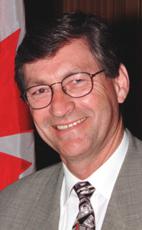No, you worry about it. That is right.
Lo and behold I am having my corn flakes this morning knowing that I am going to speak to this today and from today's Globe and Mail I would recommend to hon. members and to those of you watching these proceedings on television a very worthwhile article called ``Debasing the Franchise''. This is part one of three articles. I recommend it to everyone so they can catch a bit of the flavour and a bit of the history of just what we are talking about here. It is in today's Globe and Mail and there will be another article tomorrow and then the next day. If I may I will read just a small bit from today's Globe and Mail . It has to do with representation by population and distribution.
In any event in 1947 they had a pretty good idea that what they were going to do was base the number of seats by the representative population that Canada had and then divide that by the number of provinces and presto, you have the number of seats. As one province increases they get more seats and as another province decreases it gets less seats, except in the case of Prince Edward Island which was guaranteed four seats. That seemed like a pretty good idea at the time but it did not last.
I would like to suggest a way out of this muddle. I would suggest that we have a limit on the number of seats. There certainly will not be any problem from this side of the House in saying that we should not be increasing the number of seats in the House of Commons. Let us freeze it at 295. Let us have a strict representation by population in the House. Every province will be represented strictly in its proportionate number of seats by its population with no floors; no floors for Quebec and no floors for Prince Edward Island. Then how do we go about representing the regions or the provinces in Canada?
Let us have a Senate that represents the provinces. Let us have a triple-E Senate. That will get us out of this mess. We can have a House of Commons that will be strictly representation by population. That is magic, is it not? Then we have a Senate that represents the provinces.
A member opposite said they had not heard of this before. There may even be a few people out there in television land who
have not heard of this before. It is called a triple-E Senate. Through representation by population in the House and a triple-E Senate in the other House, we achieve what we want to achieve.
We achieve representation of all provinces equally in Canada and we achieve representation by population in this House without it growing forever. There, I submit most humbly, is my answer to the dilemma that our honourable House faces. How do we go about achieving it? It is simple.
Let us get on with it now. We know how to achieve it. We need to do something about the Senate. We are all in basic agreement with that. We will get representation by population in this House and we can get a triple-E Senate in the other House and we can all go home happy.

